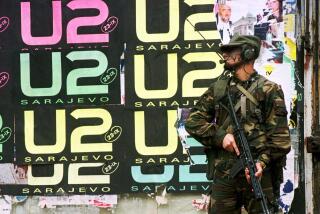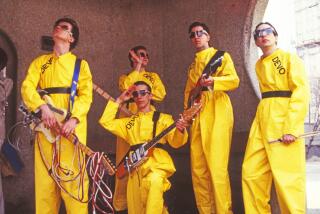U2’s Mysterious Way
- Share via
DUBLIN, Ireland — For most of its celebrated career, U2 has preached the gospel of rock ‘n’ roll tradition, toasting at every turn such personal heroes as Elvis Presley, the Beatles and Bob Dylan.
So, why is Adam Clayton, the group’s bassist, talking about such ‘90s techno-dance favorites as the Prodigy, Massive Attack, Tricky and the Chemical Brothers as he drives to U2’s recording studio on the banks of the Grand Canal Basin?
“See what you think of this,” says Clayton, who has just flown in from London, where he and drummer Larry Mullen represented the band at the MTV Europe Music Awards. He slips a cassette into the car’s tape player, and music suddenly explodes from the speakers.
It’s a burst of the sonic color you’d expect from a prized dance-floor entry--not the light audio confections associated with mainstream dance music in the United States during the last two decades but the hard-edged British dance music that bristles with attitude and bite.
Though the style is hugely popular in England, it has not secured much of a commercial foothold in America. For one thing, most of the British dance stars have tended to be relatively faceless, and the emphasis in the music is on textures rather than conventional pop songwriting techniques.
Just when you begin to wonder which of those hot British acts’ music is playing in the car, you hear a voice through the speakers that sounds suspiciously like that of U2’s Bono and some sharp, vibrating guitar lines that seem awfully similar to those of the band’s the Edge.
Some dance outfit imitating U2?
Clayton smiles.
“It’s our new single--’Discotheque,’ ” he says. “What do you think?”
That’s a question that many U2 fans will ask each other next month, when the single hits the airwaves and offers the first public clue to the musical direction of the Irish band’s first album in nearly four years.
“Discotheque” is in some ways as radical a shift from the icy sweep of 1991’s “Achtung Baby” and 1993’s “Zooropa” as those albums were from the graceful eloquence of 1987’s “The Joshua Tree.” Not everything in the new album, titled “Pop” and due in March, reflects the dynamics of the electronic dance world as fully as the single, but most of the tracks will likely have at least a touch of those sonic influences.
It’s a direction that the four members of the band were all equally enthusiastic about, they discovered, after nearly a yearlong break that followed their grueling 1992-93 world stadium tour.
“It was our first real time off in, what, 15 years?” Clayton says as he pulls up to the studio, which is housed in a building that’s undistinguishable from the other warehouse spaces in this waterfront district.
“I think we needed that break to get away from each other for a while and explore music without worrying about what U2 should be doing. I went to New York and spent some time studying music, getting to know more about the technical side of the bass.
“At the end of that period, we started to realize that we were actually all listening to the same music. I was listening to a band called Leftfield and Massive Attack and Underworld. Bono and Edge were listening to the Prodigy and the Chemical Brothers as well as Oasis and some others. We all kind of went, ‘Well, isn’t this interesting?’ You could sense that we were going to incorporate some of that sonic terrain into our own music.”
Bono and Edge are already at work when Clayton arrives. The group has been recording in this studio, with its lovely view of the water, for much of the year. Record retailers around the world had been hoping the collection would be ready this fall to help boost holiday sales. But the summer deadline proved unworkable.
One reason for the delay, Edge says, was that the group needed time to get used to mixing sampling and other techno-dance elements with its traditional songwriting approach.
This is the first time in a decade that U2 has made a studio album without producer Brian Eno, who also collaborated with the group last year on the side project “Passengers,” a series of pieces designed to accompany disparate film and theater presentations. The band members saw the project as a way to reintroduce themselves to the studio after the year off. They and Eno are still close, but all believed it was better for the band to make the new record with another producer, since the plan from the start was to move away from the ambient, atmospheric sound Eno favors.
So the group turned to Flood, the Englishman who co-produced “Zooropa” and the Smashing Pumpkins’ “Mellon Collie and the Infinite Sadness.” U2 has also been joined in the studio by Howie B, a London producer with an encyclopedic knowledge of dance-related music. Nellee Hooper, the producer who helped shape the sound of Soul II Soul in the late ‘80s, was also aboard in the album’s early stages.
The atmosphere in the studio is relaxed, even though the band’s latest deadline is only a week away.
Unlike most recording acts, which finish one track before moving on to the next, U2 listens repeatedly to various tracks recorded over recent months to see what extra touches might be applied, be it a new vocal line or instrumental shading.
Bono at times will decide to change a word or even a whole line. It’s a time-consuming approach because a new lyric or instrumental sequence could mean other adjustments in the track to make it all seem whole.
As the session stretches from late afternoon to early morning, the band, including Mullen, who arrives shortly after Clayton, will spend an hour or more on each of half a dozen tracks. Despite unifying textures, the tunes differ widely in content and form.
“Edge and I spent time together with our families in Nice during the time off,” Bono says during a dinner break at the studio, “and we spent a lot of time listening to music and thinking about what we wanted to do next, and we were intrigued by two of the directions that seem to be going on these days.
“We liked the tendency in England toward pop songwriting in the [traditional] way of Lennon-McCartney and Lou Reed--something that Noel Gallagher and Oasis are doing. But we also liked the energy and adventurousness of the techno, hip-hop world. So, we decided to explore bringing those two disciplines together. That’s what this record is about.”
Edge, who is the group’s quarterback in the studio, says the musical shift is not simply an attempt by the veteran band to reposition itself in today’s changing musical scene.
“After ‘Achtung Baby,’ there was all this talk about U2 reinventing itself, and I guess it’d be easy for someone to say we’ve reinvented ourselves again. But the changes aren’t some strategy--they come out of being interested and inspired by what other people are doing. All of a sudden you start to take on different aesthetics, something you haven’t tried before, to see where you can take it. That’s how you learn and how you grow.”
Bono, his hair now closely cropped, is sitting in a chair by the control board while the rest of the band sits on a sofa facing him. They’ve just finished listening to one of the songs for the album, and he says he wants to change some of the words.
As the instrumental track begins playing, Bono picks up a microphone and sings the new words. At the end, he looks around the room for reaction. Like R.E.M., U2 tends to work as a democracy.
The consensus is that Bono needs to put more feeling into the vocal. So he starts again. This time he delivers the new lines with such passion that he has to stand up and move with the music. At the end, everyone looks pleased.
Still, he wonders about a couple of lines in the song, which updates a familiar U2 theme: the emptiness of placing one’s faith in material goods.
Given Bono’s confidence and authority onstage, it’s fascinating to see how vulnerable he can be while waiting for his bandmates’ opinions. As they think about the lines, Bono suggests, a bit anxiously, an alternative word or two. No, no, they agree, the words are fine.
With that song finished, at least for the moment, Edge says, “OK, what’s next?”
That’s another question U2 fans will be asking in the late spring when the band tries to live up to the enormous ambitions and expectations created by its “Zoo TV” tour with another worldwide stadium trek.
Bono says the band didn’t feel wedded to another stadium tour, but it seemed to be where the aggressive nature of the new music can best be staged. If the music takes a softer turn in the future, however, the group would probably move back to smaller settings.
“It’s important to keep the options open in everything that you do,” he says. “You don’t learn by drawing a line and saying these are the limits of rock ‘n’ roll or this is the size of the buildings you should play. Success is one thing in pop music, but staying relevant is the bigger challenge.
“We are still a rock ‘n’ roll band, but when we looked around last year, it was clear that hip-hop and dance artists are making the music that defines these closing years of the 20th century, and we wanted to see what parts of that music would work for us.”
More to Read
The biggest entertainment stories
Get our big stories about Hollywood, film, television, music, arts, culture and more right in your inbox as soon as they publish.
You may occasionally receive promotional content from the Los Angeles Times.










